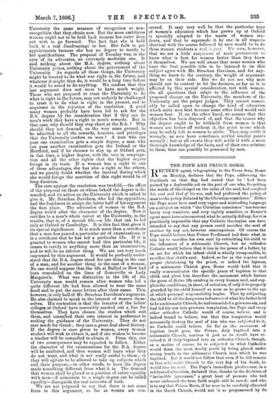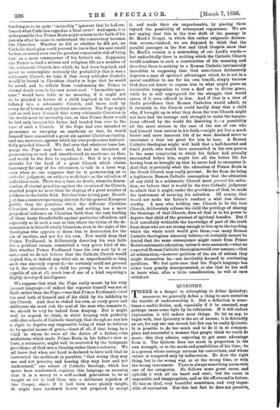THE POPE AND PRINCE BORIS.
REUTER'S agent, telegraphing to the Press from Rome on Monday, declares that the Pope, addressing the Cardinals on that day, had stated that he '• had been pained by a deplorable act on the part of one who, forgetting the words of the Gospel on the value of the soul, had sacrificed his soul and that of his son, and had preferred the policy of man to the policy dictated by the Christian conscience." Either the Pope must have need very vague and misleading language on a subject on which "the Christian conscience" has become lately very sensitive, and very rightly sensitive, or Renter's agent must have misconceived what he actually did say, for it is practically impossible that any Catholic theologian can have intended to say that any person could sacrifice the soul of another by any act, however unscrupulous. Of course the Pope would believe that Prince Ferdinand had done what in- him lay to sacrifice his own soul by submitting his child to the influences of a schismatic Church, but no orthodox Catholic would believe that it lies in the power of a father, by an act for which his infant child is wholly irresponsible, to sacrifice that child's soul. Indeed, so far as the regular and. proper christening by the priest, or indeed the layman, of a schismatic Church goes, Rome would hold that it really communicates the specific grace of baptism to that child, and gives him therefore the sacrament which fosters the germ of divine life existing in every human soul, and sup- plies the conditions, in short, of salvation, if only it be properly guarded by the child himself so soon as he grows to the age at which personal responsibility begins. That by subjecting the child to all the dangerous influences of what his father held to be a schismatic Church, he had committed a grievous sin, and had led his eon into grievous temptation, the Pope and every other orthodox Catholic would of course believe, and is indeed bound to believe, but that this temptation would necessarily destroy the soul of him who was subjocted to it, no Catholic could believe. So far as the sacrament of baptism itself goes, the Prince, duly baptised into a schismatic Church, receives it just as he would have re- ceived it if duly baptised into an orthodox Church, though, as a matter of course, he is subjected to what Catholics would deem the most deadly perils by being placed under strong bonds to the schismatic Church into which he was baptised. But it would not follow that even if he did remain in that schismatic Church to the very day of his death, he would lose his soul. The Pope's immediate predecessor, in a celebrated allocution, declared that, thanks to the doctrine of "invincible ignorance," a great host of persons who had never embraced the true faith might still be saved; and who. is to say that Prince Boris, if he were to be carefully educated in the Greek Church, would not 7)e so prepossessed by Ha. teaching as to be quite " invincibly " ignorant tbat he had em- bruced what Catholics regard as a fatal error? And again, it is -quite possible that Prince Boris might return to the faith of his parents after he came to understand the controversy between the Churches. Whether he did or whether he did not, no Catholic theologian could pretend to know that his soul would be lost, or would even run the greatest conceivable risk of being 'lost, as a mere consequence of his father's sin. Supposing the Prince to lead a serious and religions life as a member of -the schismatic Church into which he bad been baptised, and never to contemplate seriously the probability that it was a -schematic Church, we take it that every orthodox Catholic would be bound in Christian charity to hope that he would be saved, and to refrain from condemning the Prince to eternal death even in his own secret soul. "Invincible ignor- ance" would have little or no meaning, if it ought not to be pleaded in favour of a child baptised in his earliest infancy into a schismatic Church, and there held by every tie of human and spiritual association. The Pope might ast as well have declared that every schismatic Christian in the world must be inevitably lost, as that Prince Boris would be lost only because his father had handed him over to the oare of such a Church. If the Pope had ever intended to pronounce so sweeping an anathema as that, he would himself have committed a great sin against Christian charity, and one, moreover, against which his own predecessor had care- fully guarded himself. We feel sure that whatever loose lan- guage the Pope may have used, he had no intention of pronouncing so rash and unauthorised an anathema as that, and would be the first to repudiate it. But it is a serious mistake for the head of a great Church which claims inerrancy for any of his utterances, to talk in a loose way, -even when no one supposes that he is pronouncing an ex -rcithedrd judgment, on subjects so delicate as the salvation of -individual souls. There was a time, no doubt, when the denun- ciation of eternal penalties against the enemies of the Church, etartled people no more than the slaying of a great number of soldiers on the battle field. But that time is long past. No sub- tct has a more overpowering interest for the general European public than the penalties which the different Christian Churches denounce against sin, and nothing has a more ,prejudical influence on Christian faith than the rash hurling of these hasty thunderbolts against particular offenders, and especially so in such a case as this, where the victim of the de- catmciation is himself wholly blameless, even in the sight of the theologian who appears to doom him to destruction for the sin of another, and not for his own. Few would deny that Prince Ferdinand, in deliberately deserting his own faith for a political reason, committed a very grave kind of sin. But whether Prince Ferdinand loses his own soul by it or -uot,—and we do not believe that the Catholic Church would regard this, or indeed any other sin, as unpardonable so long .as it was sincerely repented,—he certainly could not prevent by it the salvation of a child too young to be so much as -capable of sin at all, much less of one of a kind requiring a highly developed intelligence.
We suppose that what the Pope really meant by his very Znexact language,—if indeed the reporter himself was not at fault rather than the Pope,—was that Prince Ferdinand risked the soul both of himself and of his child by his infidelity to -his Church. And that he risked his own, as every grave and deliberate sin must risk the soul of the man who commits it, we should be very far indeed from denying. But it might well be argued, we think, in strict keeping with perfectly -orthodox schools of Catholic theology, that though no one has a. right to deprive any responsible being of what he believes t o be special means of grace,—least of all, if that being be a child to whom he owes all the duties of a father,—the misfortune which made Prince Boris, in his father's view at &east, a schismatic, might well be overruled by the benignant providence of God into a blessing rather than a calamity. We all know that when our Lord is declared to have said that he instructed the multitude in parables, "that seeing they may see and not perceive, and hearing they may hear and not sanderstand," one school of Catholic theology, which has never been condemned, explains this language as meaning t hat it is a mercy to a stiff-necked generation to be so taught as not to lead them into a deliberate rejection of tee Gospel, since, if it had been more plainly taught, it might have hardened hearts not prepared to accept it, and made their sin unpardonable, by placing them beyond the possibility of subsequent repentance. We are not saying that this is the true drift of the passage in St. Mark's Gospel, in which this rather enigmatic declara- tion occurs,—indeed, we are disposed to think that the parallel passages in the first and third Gospels show that St. Mark's version is a misreading of our Lord's words,— but undoubtedly there is nothing which the Catholic Church would condemn in such a construction of his meaning, and therefore there is nothing to a Roman Catholic intrinsically incredible in supposing that God sometimes deliberately deprives a man of spiritual advantages which he is not in a moral condition to use for his own benefit, simply because God does not desire to expose him to what might prove an irresistible temptation to turn a deaf ear to divine grace, while he is still unprepared for the struggle that would ensue, if it were offered to him. And if that is a view of God's providence that Roman Catholics would admit, as it certainly is, the Church could hardly deny that a child who, if brought up in what they deem the true Church might not have had the courage and strength to resist the tempta- tions offered by the world for deserting it,—a possibility all the more serious in the case of the son of one who had himself been untrue to his faith,—might yet live a much better and more innocent life if he were destined never to encounter a trial too great for him to bear. A Roman Catholic theologian might well hold that a half-hearted and timid youth, who would have succumbed in his own person to the same temptation to which his father had actually succumbed before him, might live all the better life for having been so brought up that he never had to encounter it. And that is precisely what the education of Prince Boris in the Greek Church may really prevent. So far from its being a legitimate Roman Catholic assumption that the education of any child in a schismatic Church must prevent his salva- tion, we believe that it would be the true Catholic judgment to admit that it might, under the providence of God, be made the instrument of securing his salvation. Of course, that would not make his father's conduct a whit less blame- worthy. A man who, holding one Church to be the true Church, deliberately refuses his child the privilege of sharing the blessings of that Church, does all that is in his power to deprive that child of the greatest of spiritual benefits. But if God mercifully withholds the knowledge of part of the truth from those who are not strong enough to live up to the teaching which the whole truth would give them,—as many Roman Catholic theologians sincerely believe,—it certainly cannot be denied that the same consequence might result from Prince Boris's schismatic education, unless it were assumed,—what no respected Roman Catholic theologian would ever assume,—that all schismatics,—however guiltless of the sin of schism they might themselves be,—are inevitably doomed to everlasting perdition. We feel quite sure that the Pope's language has either been greatly misrepresented, or else that he has said in haste what, after a little consideration, he will at once withdraw.







































 Previous page
Previous page